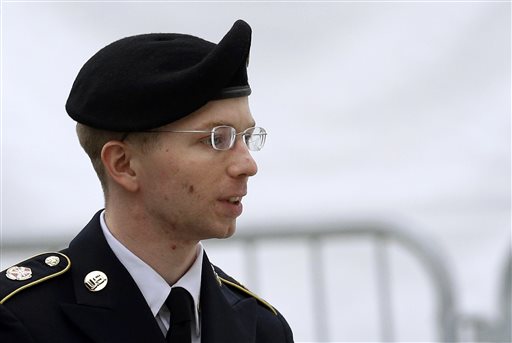FORT MEADE, Md. - A video of a U.S. Apache helicopter attack leaked by Pfc. Bradley Manning revealed sensitive information that could help enemies plan deadlier assaults, according to a Pentagon official's statement read Wednesday at the soldier's court-martial.
The cockpit video showed digital display information about the helicopter's airspeed and angles of engagement, according to Chief Warrant Officer 5 Jon LaRue's statement that was admitted as evidence.
"Enemies can anticipate U.S. operations and plan more effective attacks as a result," LaRue said in his statement.
LaRue is an Apache helicopter expert. His statement was about a 2007 attack in Baghdad that killed a Reuters news photographer and his driver.
Prosecutors want to convict Manning of 21 charges, including aiding the enemy, which carries a potential life sentence. They say he divulged information that found its way to Osama bin Laden.
Manning, a 25-year-old Oklahoma native, has said he didn't believe that the more than 700,000 battlefield reports, diplomatic cables and video clips he leaked while working as an intelligence analyst in Baghdad would hurt national security.
Also Wednesday, a defense attorney won an objection after prosecutors said they could not produce a computer security agreement the soldier signed after arriving in Iraq in 2009.
Manning allegedly violated the agreement in three of charges he faces: two military charges for adding unauthorized software to his work computer and one federal computer fraud charge for exceeding his authorized access.
Prosecutors wanted to enter a sample form of the agreement into evidence but Manning's attorney David Coombs objected and the judge didn't allow it.
Prosecution witness Capt. Thomas Cherepko was the unit's information assurance manager. He says all of the computer "acceptable use agreements" were routinely destroyed when the unit returned home. But he said the one Manning signed disappeared and couldn't be found shortly he was arrested.
Defense lawyers also attacked the government's assertion that Manning started sending classified information to WikiLeaks within weeks of starting work as an intelligence analyst in Iraq in 2009.
Army computer crimes investigator Mark Johnson testified on cross-examination he found no evidence on Manning's personal computer of WikiLeaks' "Most Wanted Leaks of 2009." The government alleges Manning used the list as a guide to obtain documents and videos for the anti-secrecy website.
Johnson also testified on cross-examination that he found no evidence that WikiLeaks founder Julian Assange asked Manning for anything specific in a series of online chats and email exchanges.
Manning's court-martial is moving along faster than expected. Col. Michelle Roberts, a spokeswoman for the Military District of Washington, said the court-martial was a week or two ahead of the government's projected schedule. The trial began last week. It was originally projected to run through August or September.
She said the pace is partly due to agreements between prosecution and defense attorneys to accept written statements from witnesses instead of having them testify in court.
The trial will resume Monday.

